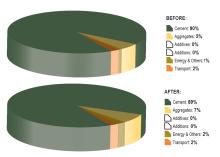Reductions in CO2 and environmental incidents and an increase in the use of alternative fuels are the main achievements claimed by
Key improvements included a 59% reduction in environmental incidents, a 30% increase in the use of alternative fuels and a 10% reduction of CO2 per tonne of product.
The company also increased the use of rail freight by 20% and was among the first in the industry to become certified to the Building Research Establishment Framework Standard for the Responsible Sourcing of Construction Products (BES 6001) for its 230 ready mixed concrete plants. The entire business has since been certified.
According to Cemex, the vital factor in reducing CO2 emissions has been the 30% increase in the use of alternative fuels to part-replace fossil fuels, such as coal, to heat the company’s cement kilns. This includes Climafuel which is derived from household and commercial waste.
In 2009, Cemex used more than 100,000tonnes of Climafuel produced from approximately 200,000tonnes of waste that would otherwise have gone to landfill. Based on the biomass content of the fuel, the use of alternative fuels saved over 160,000tonnes of CO2, equivalent to that produced by around 64,000 cars in a year.
Cemex UK president Gonzalo Galindo said, “As one of the UK’s largest building materials companies in the UK our products are part of the fabric of a sustainable Britain. But our business has consequences for people and the environment.
“This report records our progress in balancing these impacts with the need to build a more sustainable future. Since our last report, the focus on a more sustainable future has been integrated further into our business to ensure we are on course to achieve Government targets and make it easy for our customers to deliver on theirs.”









